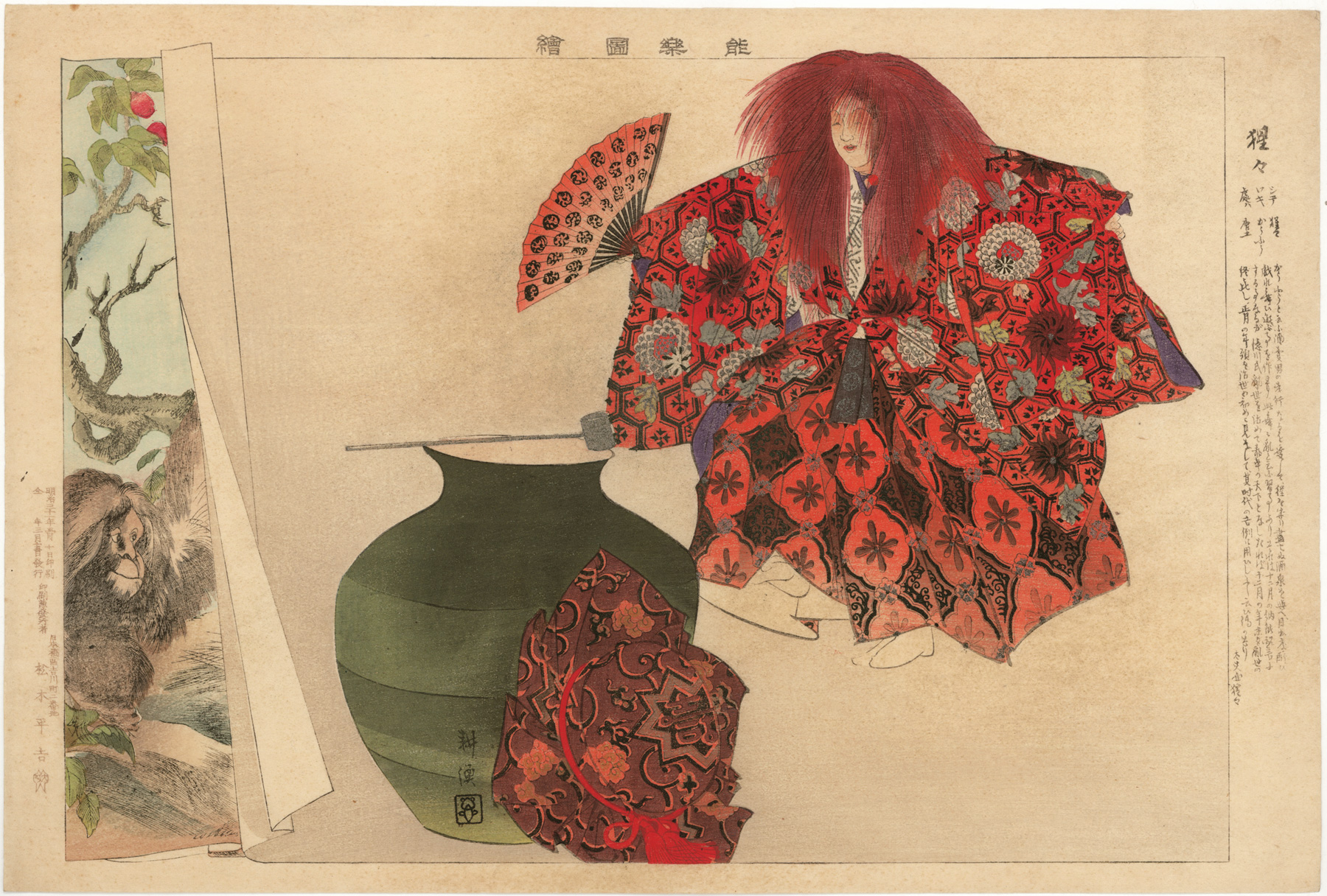About This Print
For background on the Noh theater see the article on this site "Noh - A Brief Summary by Beata Kubiak Ho-Chi".
Museum Commentary:
Source: Ruth Chandler Williamson Gallery http://web-kiosk.scrippscollege.edu/OBJ?sid=12048&rec=230&port=414&art=0&page=230
Chinese mythical creatures called xing xing are thought to be wine loving red haired apes, often associated with the orangutan. In this print, Kōgyo shows the real ape at left and the actor at right, who dances before an enormous wine pot.
Right Margin Description of Scene
click on image to enlarge
The Play - Shōjō
Source: A Guide to No, P.G. O'Neill, Hinoki Shoten, 1929, p. 163-164.
Characters:Waki - Kō-fū, a wine dealerShite - an elf-like creature
A man named Kō-fū, living in ancient China, explains that by following a dream which he had in reward for his filial piety and which told him to sell wine in the market, he has become a prosperous man. At the market, there is one particular person who always comes to him to buy wine, and since he told the dealer that he is an elf living in the sea, the man has come down to the estuary to wait for him to appear. When he does so, red-faced from his drinking, the man serves him with wine and watches him dance. The elf, in return, gives him a well of wine which never runs dry.
Source: A Guide to No, P.G. O'Neill, Hinoki Shoten, 1929, p. 163-164.
Characters:
Waki - Kō-fū, a wine dealer
Shite - an elf-like creature
A man named Kō-fū, living in ancient China, explains that by following a dream which he had in reward for his filial piety and which told him to sell wine in the market, he has become a prosperous man. At the market, there is one particular person who always comes to him to buy wine, and since he told the dealer that he is an elf living in the sea, the man has come down to the estuary to wait for him to appear. When he does so, red-faced from his drinking, the man serves him with wine and watches him dance. The elf, in return, gives him a well of wine which never runs dry.
Source: website of the Noh.com http://www.the-noh.com/en/plays/data/program_053.htmlThis drama is filled with a celebratory atmosphere. It is often performed with Kogaki or special staging features, whose performances are called “Midare” or “Shōjō-midare”. When this piece is performed in these special styles, the shite or protagonist performs a unique dance, “midare” instead of chū-no-mai. In this case, this drama is called “Midare” or “Shōjō-midare”, not “Shōjō”, in the program. “Midare” and “Shōjō-midare” are categorized as one of the hiraki-mono, the group of Noh dramas which demand highly advanced technique and psychological maturity of the performers. It therefore requires special training to perform. Other than this unique dance, the other special staging features include funny ones, such as showing wine jars and bringing many Shōjō on the stage.
The story is simple, therefore the focal point is not in the storyline but rather in the expression of the celebrating, auspicious atmosphere. Please enjoy the dance of joy of Shōjō, a winsome monster with a red face.
Print Details
| IHL Catalog | #1927 |
| Title | Shōjō 猩々 (The Tippling Elf) |
| Series | Nōgakuzue 能樂圖繪 (Illustrations of Noh) |
| Artist | Tsukioka Kōgyo (1869-1927) |
| Signature |  |
| Seal | Square Baku seal (as shown above) Seal No. 61 in The Beauty of Silence: Nō and Nature Prints by Tsukioka Kōgyo (1869-1927), Robert Schaap & J. Thomas Rimer, Hotei Publishing, 2010, p. 170. |
| Date | Printed on March 10, 1898 / Issued on March 15, 1898 明治三十一年三月十日印刷 / 仝年三月十五日発行 |
| Edition | unknown |
| Publisher | Matsuki Heikichi (Daikokuya Heikichi 大黒屋平) [Marks: pub. ref. 029] followed by Daikokuya seal. Address: 日本橋区吉川町二番地 |
| Carver | |
| Impression | good |
| Colors | excellent |
| Condition | good - toning and minor soiling throughout; not backed; full size |
| Genre | nishiki-e; 能楽図絵 Nōgaku zue [Noh play picture] |
| Miscellaneous | The Museum of Fine Arts, Boston notes Part I, Section II, zenpen, ge, 前編、下 |
| Format | ōban yoko-e |
| H x W Paper | 9 1/2 x 13 7/8 in. (24.1 x 35.2 cm) |
| H x W Image | 8 13/16 x 12 7/8 in. (22.4 x 32.7 cm) area within printed black border |
| Collections This Print | Art Research Center, Ritsumeikan University arcUP0943 (February 15, 1899); Museum of Fine Arts, Boston 2006.11068 (March 10, 1898); Art Institute Chicago 1939.2258.100 (1898?); University of Pittsburgh 20091209-kogyo-0271 (March 20, 1898); Ruth Chandler Williamson Gallery 2010.4.52 (May 10, 1898); Smithsonian Institution Freer/Sackler S2003.8.2889 (March 20, 1898); Japan Arts Council BK014-118 (?) |
| Reference Literature |
9/24/18




